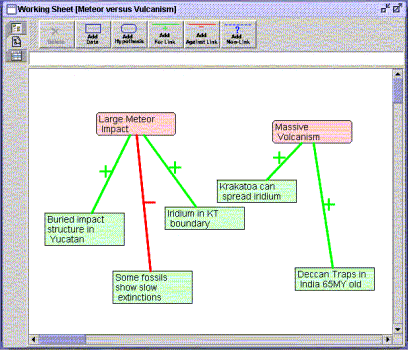Argumentation Visualisation Tools
What are they?
Argumentation visualisation tools are a variant of concept-mapping tools that have the express purpose of promoting students’ skills in constructing and evaluating arguments; for example, on contentious issues. Unlike “generic” concept-mapping tools, they can give students advice on the structure or strength of their arguments.
How can I use them with my students?
You can use an argumentation visualisation tool to help students move away from narrative writing towards presenting reasoned arguments. Representing “pro” and “contra” ideas in diagrammatic format instead of continuous prose will help them to focus on structure as well as content.
Examples
We are still researching examples and case studies for this topic. If you would like to contribute any (whether from your own teaching or from other sources), please contact us.
Where can I get one?
Most of the currently available tools were originally developed as part of research projects, but are now available for general educational use. They include:
- Rationale. This tool aims to help students “think and communicate critically and effectively” (Austhink Website). Originally developed under the name Reason!Able at the University of Melbourne, it is now marketed commercially. However, you can download a 30-day trial version.
- Belvedere - designed to support scientific reasoning, particularly through collaborative problem-solving. Developed at the University of Pittsburg and now maintained by the University of Hawaii, the tool is free.
- Convince Me - intended to help students structure and evaluate arguments and obtain feedback from a connectionist model. Developed at the University of California, Berkeley, the tool is free.
All three tools, and the research into their pedagogical effectiveness, are reviewed in van den Braak, S. et. al. (2006), A critical review of argument visualization tools: do users become better reasoners? (Workshop notes of the ECAI-06 Workshop on Computational Models of Natural Argument).

